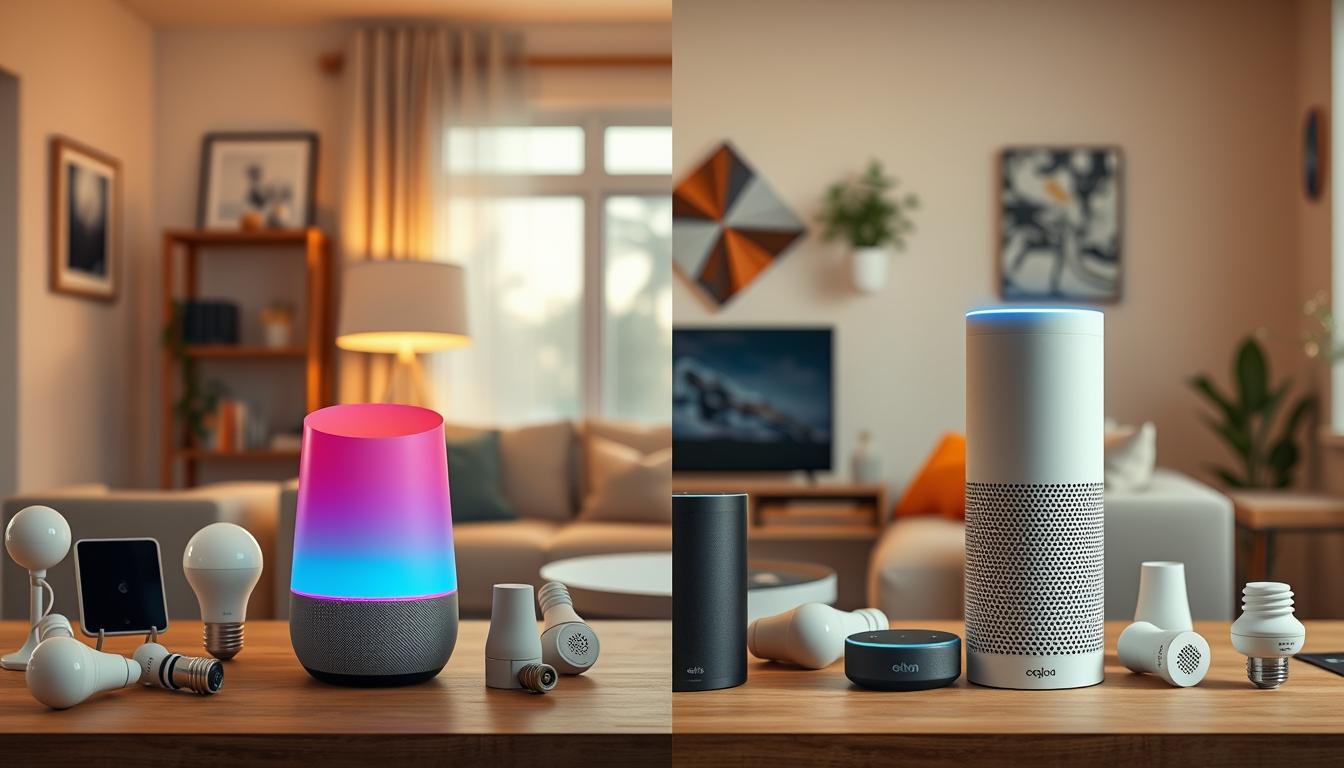I started exploring smart home devices and wondered which one was best for me. I looked at Google Home and Alexa for home automation. I wanted to see which one would work better for my needs.
With more people wanting smart home devices, I decided to compare these two. I aimed to find out which one would offer the best experience.
In this article, I’ll compare Google Home and Alexa in detail. We’ll look at their features, how to set them up, and their prices. This will help you choose the right device for your home and see which one comes out on top.
My First Impressions of Google Home
When I opened the box of Google Home, its sleek design caught my eye. It’s modern and simple, fitting well in any room. I was eager to try out its features and set it up.
The setup was easy, thanks to a detailed manual. But, I think some might find it tricky if they’re new to smart home tech. Here’s how to make it simpler:
- Download the Google Home app and create an account
- Plug in the device and follow the in-app instructions
- Connect Google Home to your Wi-Fi network
- Start exploring the various Google Home features and settings
Google Home comes in different colors, so you can match it to your home. Its design is both good-looking and practical. It’s small but packs a lot of quality, showing off Google Home’s features and setup.
My first thoughts on Google Home were good. I’m looking forward to learning more about it. Its design, easy setup, and great features make it a top pick for home automation.
Unpacking the Features of Alexa
Alexa makes smart home automation easy and convenient. You can control your devices with voice commands. This creates a seamless experience. Alexa also works with many smart devices, perfect for those with a smart home setup.
Some of the key Alexa features include:
- Smart home device compatibility, allowing users to control their devices with voice commands
- Advanced voice recognition capabilities, making it easy to communicate with Alexa
- Integration with various smart devices, including lights, thermostats, and security cameras
Alexa learns and adapts to your behavior, making it personal. You can use voice commands to create custom routines. This automates your smart home devices, making life easier and more convenient.
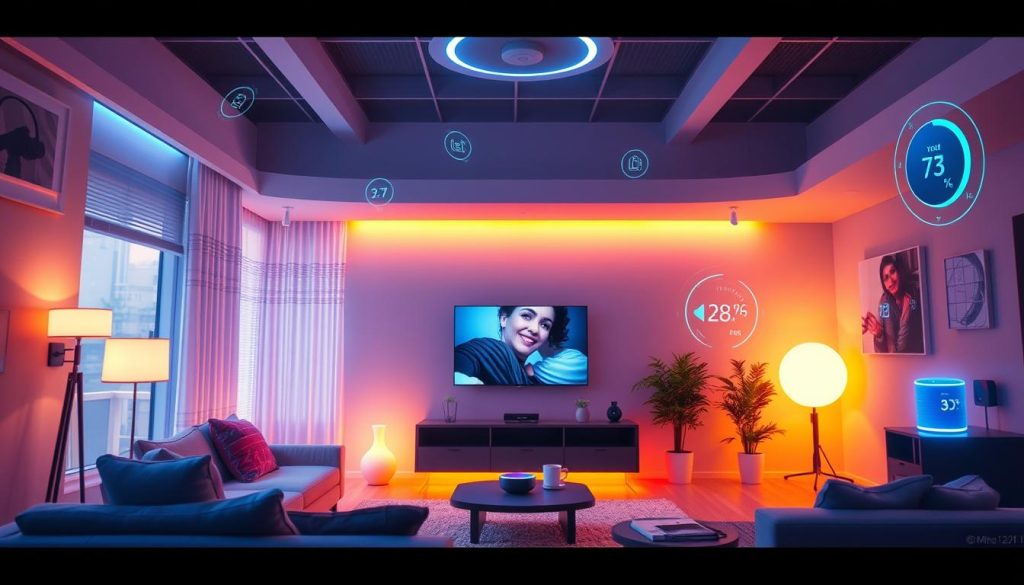
Overall, Alexa is a great choice for a convenient smart home device. Its voice commands and compatibility with many devices make it versatile. It creates a seamless smart home experience.
Comparing Smart Home Integration
Google Home and Alexa both make controlling your devices easy. But, they differ in what devices they work with. Google Home works with fewer devices, while Alexa supports a wide range, from thermostats to security cameras.
Alexa’s wide range of supported devices makes it great for a full smart home setup. Google Home, though limited, still meets basic needs. Your choice depends on what you need for your smart home.
Key Differences in Smart Home Integration
- Google Home compatible devices: limited but sufficient for basic smart home integration
- Alexa smart home ecosystem: more comprehensive, including a wide range of devices
- Smart home integration: both Google Home and Alexa offer seamless experiences
When choosing between Google Home and Alexa, think about what you need. Alexa is better for a full smart home. Google Home is simpler for basic needs.
Your choice between Google Home and Alexa depends on your needs. Knowing what each offers helps you decide what’s best for you.
| Smart Home Device | Google Home Compatibility | Alexa Compatibility |
|---|---|---|
| Smart Thermostats | Limited | Extensive |
| Security Cameras | Limited | Extensive |
| Smart Lighting | Available | Available |
User Experience: Google Home vs. Alexa
When it comes to controlling my smart home devices, I want it to be easy. Both Google Home and Alexa make it simple to manage my devices. But, Google Home’s voice recognition is better, letting me use more complex commands.
Google Home is more intuitive for me. It’s easy to set up, and the Google Home app is straightforward. Alexa, on the other hand, has fewer customization options, which might not appeal to everyone.
Key Features Comparison
- Google Home: advanced voice recognition, comprehensive customization options, and seamless integration with other Google devices
- Alexa: limited customization options, but offers a wide range of skills and third-party integrations
My experience with Google Home and Alexa has been good. Google Home is easier to use, but Alexa’s skills and integrations are impressive. It’s all about what you need.
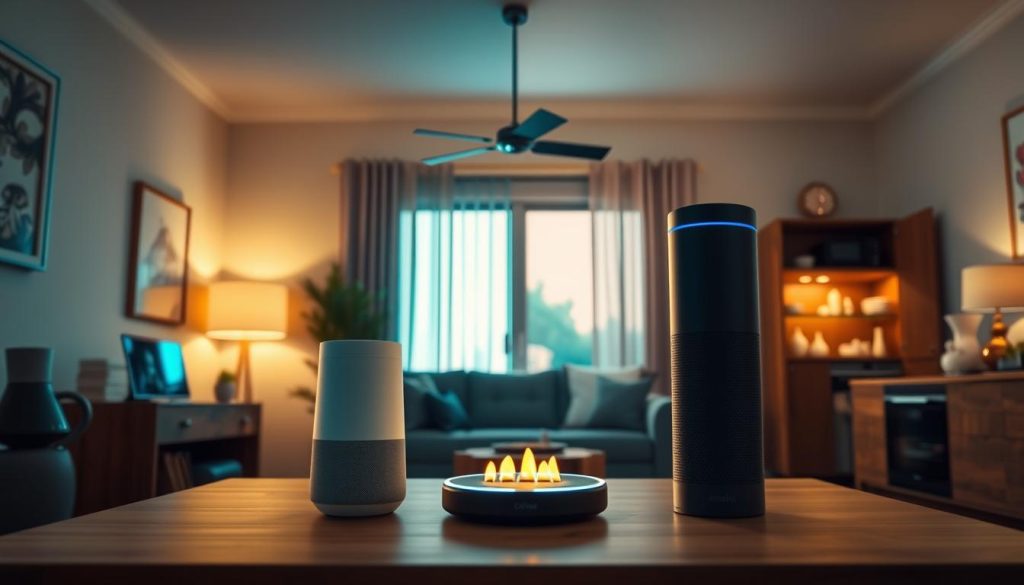
In conclusion, the choice between Google Home and Alexa depends on what you value most. Think about the features and capabilities each offers. This will help you pick the best smart home device for you.
| Device | Ease of Use | Customization Options | Voice Recognition |
|---|---|---|---|
| Google Home | Easy | Comprehensive | Advanced |
| Alexa | Easy | Limited | Good |
Pricing and Value for Money
Pricing is key when choosing smart home devices. Google Home and Alexa have different prices for their models and features. Google Home is often cheaper, especially when compared to Alexa’s advanced models.
Both devices offer lots of features and work well with other devices. Google Home starts at $99, while Alexa starts at $69. But, think about the total cost of your smart home setup.
Here’s a breakdown of the pricing for each device:
- Google Home: $99 – $299
- Alexa: $69 – $249
Choosing between Google Home and Alexa depends on your needs and budget. Google Home is a good choice if you want a budget-friendly option with lots of features. Alexa is better if you’re already using Amazon products.
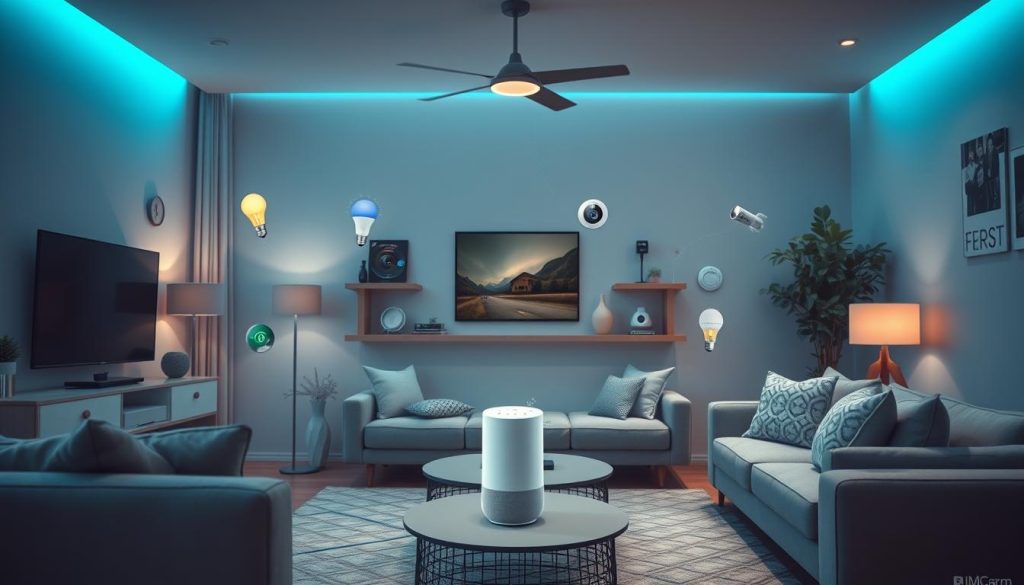
| Device | Price | Features |
|---|---|---|
| Google Home | $99 – $299 | Voice assistant, smart home integration, multi-room audio |
| Alexa | $69 – $249 | Voice assistant, smart home integration, skills and third-party integrations |
Unique Strengths of Google Home
Exploring Google Home, I found its standout features. The Google Assistant knowledge base is a big plus. It offers a wide range of information and answers to many questions. This is great for staying current on various subjects.
Google Home also shines with its multi-room audio. It lets users control music in different rooms. This is perfect for those who love music and want it everywhere in their home.
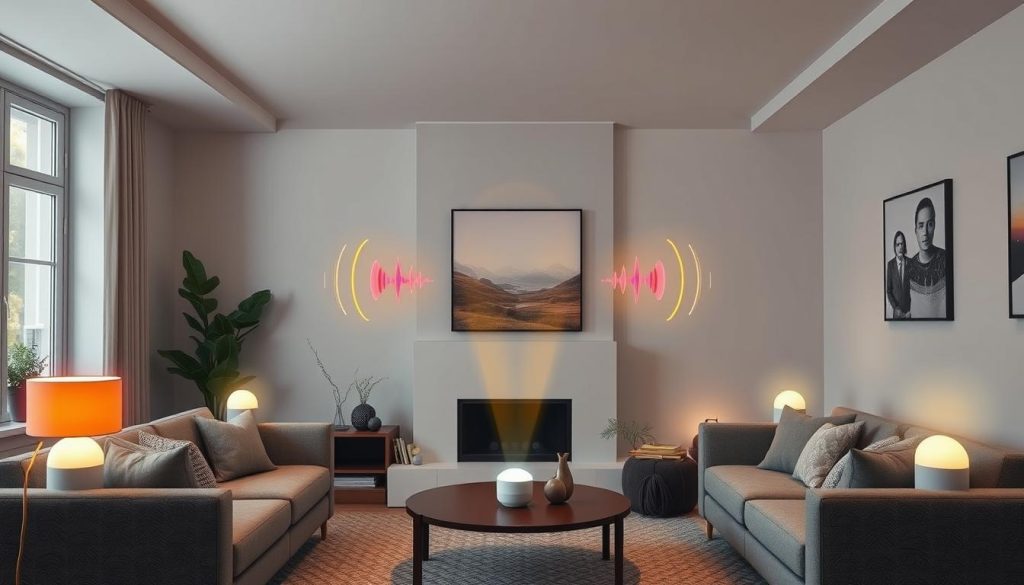
- Access to a vast knowledge base through Google Assistant
- Seamless multi-room audio capabilities
- Easy control of music playback across multiple rooms
Google Home is a top pick for a smart speaker. It offers a full home automation experience. With its unique strengths, Google Assistant, and multi-room audio, it’s a great choice for enhancing your smart home.
Unique Strengths of Alexa
Alexa does more than just take voice commands. It has features that make it perfect for smart home control. One big plus is its ability to set up custom routines and automation. This lets users do many things at once with just one command.
Another great thing about Alexa is its skills and third-party integrations. There are thousands of skills available. Users can get news, entertainment, and control smart home devices all in one place. This makes Alexa very useful and powerful.
Some of the key benefits of Alexa’s routines and automation capabilities include:
- Customizable routines: Users can create custom routines to automate multiple actions with a single voice command.
- Smart home device integration: Alexa can integrate with a wide range of smart home devices, making it easy to control and automate multiple devices.
- Third-party skills: Alexa’s skills and third-party integrations allow users to access a wide range of services and integrations, from news and entertainment to smart home devices and more.
Overall, Alexa is a strong tool for smart home automation. Its ability to create custom routines and automate tasks makes it perfect for streamlining daily activities. It’s a great choice for anyone looking to make their life easier.
Battery Life and Performance
Google Home and Alexa are both top picks for battery life and performance. Google Home is known for its reliability, with fewer connectivity problems. This is key for a smooth smart home experience, where devices must always work well.
Alexa also shines, with quick responses and easy connections with other smart devices. Reviews show Alexa’s battery lasts a long time, perfect for those who need a device that keeps up.
Key Features
- Google Home’s reliability: consistent and fewer connectivity issues
- Alexa’s performance: fast response times and seamless integration
- Long battery life: both devices offer extended battery life for uninterrupted use
Both Google Home and Alexa excel in battery life and performance. But Google Home’s reliability gives it a slight advantage. It’s ideal for those who want a smart home experience without hassle.
The choice between Google Home and Alexa depends on what you need. Both are reliable and efficient, making them excellent for upgrading your smart home.
| Device | Battery Life | Performance |
|---|---|---|
| Google Home | Long-lasting | Consistent and reliable |
| Alexa | Extended battery life | Fast response times and seamless integration |
Making My Decision: Which One Wins?
After comparing Google Home and Alexa, I’ve made my choice. Google Home is better for my needs. It beats Alexa in several important ways.
Final Thoughts
Google Home’s voice recognition and multi-room audio are top-notch. It also integrates well with Google’s vast knowledge base. This makes it great for answering questions and providing useful info.
Recommendations for Users
If you want a smart home assistant that’s easy to use, choose Google Home. It has advanced features and reliable performance. It’s perfect for those who use Google products.
But, Alexa is still a strong choice. It has a huge network of third-party skills and integrations. The right choice depends on what you need for your smart home.

